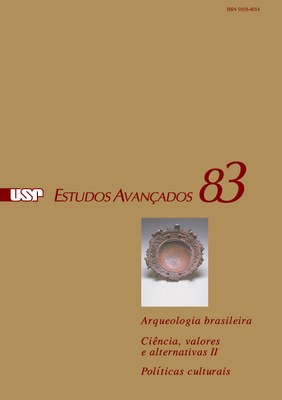'Estudos Avançados' Journal Discusses the Identity of Brazilian Archeology

“Is there an original theoretical contribution that Brazilian archeology can make to this discipline?” The author of the question is Eduardo Goes Neves, researcher at USP’s Museum of Archaeology and Ethnology (MAE) and organizer of the dossier “Aspects of Brazilian Archaeology” that opens the new edition (No. 83) of the Estudos Avançados journal. (The digital edition is available at SciELO.)
In addition to discussing the identity of Brazilian archeology, the dossier also brings articles on Amazonia, the Pantanal region, the ethylic practices of the Tupi-Guarani, early settlement of South America and the cultural landscapes of the southern Brazilian plateau.
History and temporality
In the introductory article, Is There Something We Can Call “Brazilian archeology”?, Neves assesses whether there is a corpus of problems and specific data that are unique to, or at least a prerogative of, Brazilian archeology. Although he does not have a clear answer to the question, he is certain that it involves the concepts of history and temporality of South American indigenous societies.
Neves’ article is discussed by Ulpiano Bezerra de Meneses, professor emeritus at the School of Philosophy, Literature and Human Sciences (FFLCH), and author of the essay The Identity of the Brazilian Archaeology.
For Meneses, the conciliation of history and temporality advocated by Neves is exciting and ethnographically feasible, but archaeologically presents numerous difficulties because “from the point of view of the groups that we studied, we cannot assume the same kind of relationship we have with artifacts.”
With regard to the framework of reference of Brazilian archaeologists, Meneses said it is necessary “to reiterate the warning made by Eduardo Neves: we must look less outside the continent for theoretical references, and conversely, more at the available local evidence.”
The other articles of the dossier are: Agricultural Determinism in Amazonian Archeology, by Claide de Paula Moraes; Archeology and Indigenous History in the Pantanal Region, by Eduardo Bespalez; The Archaeology of Fermented Brews: An Ethylic History of the Tupi-Guarani People, by Fernando Ozorio de Almeida; Early Settlements in South America: Contributions of the Brazilian Milieu, by Lucas Bueno and Adriana Dias; and The Genesis of the Cultural Landscapes of the Southern Brazilian Plateau, by Silvia Moehlecke Copé.
Science and values
In addition to the dossier on Brazilian archeology, issue no. 83 of Estudos Avançados publishes the second part of the dossier “Sciences, Values and Alternatives,” organized by the History, Philosophy and Sociology of Science and Technology research group, which brings the findings of studies made by the group under FAPESP’s thematic project “Genesis and Meaning of Technoscience: The Relationships Between Science, Technology and Values.”
Whereas in the first part (published in issue 82) the texts addressed methodological concerns of researches on the relationship between science and values, this time the articles examine three areas where attention to values is crucially important: agro-ecology, health and biodiversity.
The first topic is discussed by Hugh Lacey in Agroecology: An Illustration of the Fruitfulness of Multi-Strategy Research, and by Rubens Onofre Nodari and Miguel Pedro Guerra in Agroecology: Research Strategies and Values. Lacey was visiting professor at the IEA in 2011 and 2013, and currently heads the Agroecology Workgroup of the IEA-USP’s Philosophy, History, and Sociology of Science and Technology Research Group.
The other two topics are covered by Nicolas Lechopier, visiting professor at the IEA in 2013, who contributes with Four Tensions in Public Health, and by Ana Tereza Reis da Silva, author of The Conservation of Biodiversity Between Traditional Knowledge and Science.
Other articles
The journal also features articles on economics, orthographic changes, and anthropology.
Economist Ladislau Dowbor, professor at PUC-SP, is the author of The Current Financial System Hampers Economic Development, where he analyzes how the system of financial intermediation sterilizes a country’s assets by draining staggering amounts of resources that should be directed to productive and economic development.
In A Serene and Scientific View of the New Orthographic Agreement, philologist Evanildo Bechara, from the Brazilian Academy of Letters, examines criticism of the 1990 Orthographic Agreement.
In the article The Occupation of Congress: What Are the Indigenous People Fighting Against?, anthropologists Artionka Capiberibe, from Unicamp, and Oiara Bonilla, from the Fluminense Federal University (UFF), address the clash between politics and the economic model that underlies the resistance of indigenous peoples to agribusiness and its representatives in Congress.
The edition also includes reviews of the latest books by Nabil Bonduki, Ana Paula Koury, Marco Bobbio, Michael Löwy, Mauro Rosso (as organizer), and an essay by Lorenzo Mammi on the installation “Clara Clara,” by Laura Vinci.
